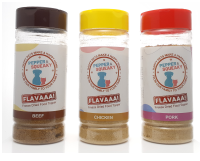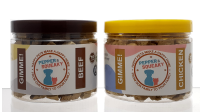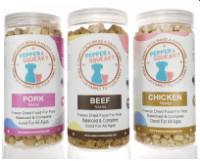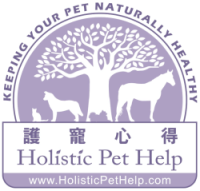Carbs are BAD for Pets
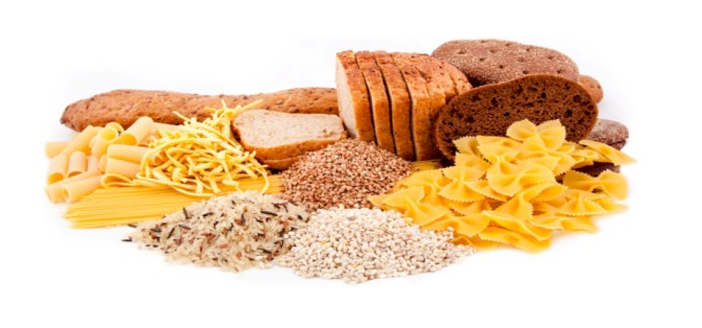
Eating the wrong stuff can kill your pet
There's an old Chinese proverb says "We eat anything with four legs and its back to the sky, except the table!" It's no wonder. Hunger can make you do crazy things, and it appears that there's little on the face of this planet that someone, somewhere at some time hasn't attempted to eat.
Over the ages thousands died - of poisonings, acquired diseases and infestations as well as many other nasty consequences that spring from putting the wrong stuff in your mouth. Those deaths, mercifully, were usually quick.
Humans Are Omnivorous
Technically speaking, humans didn't start out as omnivores. Millions of years ago, the common ancestor we share with chimpanzees was essentially a herbivore. We became omnivores for two really important reasons: Fending off the constant threat of starvation for 99.999% of the time our species has been on this earth, and a digestive system trade-off that involved shrinking our gut in exchange for a big brain. But, even though we domesticated grains at least 10,000 years ago, the wholesale transition of all humans is not yet complete. There are still many among us who get sick from eating grains due to gluten intolerance. Gluten is a name for the proteins found in wheat and rye. So, even while we have evolved over millions of years to be able to metabolize grasses, fruit and meat meat, we still struggle with grains.
Pets Are Primitive and Opportunistic Eaters
Like humans, domesticated animals also have a wild ancestor back in the mists of time. For dogs, it's a more ancient and primeval member of the canine family, like wolves or wild African dogs. For cats, who are much less domesticated than dogs, it's a member of the feline family like panthers or the lynx. But their timeline to the primeval ancestor is very short. For dogs we think it is something around 30,000 years. Cat are perhaps half that far away.
This is why something that still makes a lot of people sick (grains) are really unhealthy for pets. Foods that people can in certain circumstances barely tolerate are completely inappropriate, uncomfortable and sometimes even dangerous for pets to eat. Chocolate, grapes and onions are notable examples of foods that dogs should not eat. There's a similar list for cats.
Carbohydrates Are Endemic
Pets do not need to consume plant-based carbohydrates to stay healthy. So, you may wonder, why are so many commercial pet foods touting their plant ingredients as if it was a good thing, and why do so many include plant-based carbohydrates in their list of ingredients? It's simple. Human greed, profit-seeking and prejudice are working behind the scenes. Carbohydrates are an inexpensive way to boost the caloric content of food, and they are often used anyways as a binder to hold kibble together. Yes, they enable your pet to easily (perhaps too easily) obtain food energy, but the unnatural way they're insinuated into the food creates a very unnatural and stressful way for your pets to get that energy into their diet. Finally, people have been trained to look at carbohydrates as the base of the "food pyramid" that we have all been exposed to - incorrect though it has proven to be.
Poison Kills Quickly, Carbohydrates Kill Slowly
Many experts and studies have linked carbohydrate intake to an increased incidence of major diseases such as cancer, diabetes, obesity and arthritis in animals as their carbohydrate intake increases. These effects are not limited to pets. As our own intake of carbohydrates increase, we are observing the same pathology in humans, especially in terms of obesity and the diseases directly and indirectly related to that condition.
Conclusion
Avoiding carbohydrates should be a top priority for any pet owner who is concerned with the long-term prognosis and quality of life of their pets. Pet owners may also want to limit their own intake of carbohydrates to avoid obesity and its associated complications. Commercial pet foods contain a lot of carbohydrates, and should be avoided if possible. The best diet for your pet is as carbohydrate-free as possible, and options for owners include feeding freeze-dried pet food or even feeding pets raw meat.
How We Can Help
Pepper & Squeaky Freeze Dried Pet Food Toppers
Pepper & Squeaky Freeze Dried Pet Food Toppers are 98% pure meat (including organ meat) with the remaining 2% being added trace elements such as vitamins, minerals, amino acids and enzymes to help complete its nutritional profile. Feel free to read the label for more information about specific ingredient types and their composition.
Pepper & Squeaky Freeze Dried Pet Treats
Pepper & Squeaky Freeze Dried Pet Treats are 100% pure organ meat (Beef or Chicken Liver). The organ meat is cubed and then freeze dried.
Pepper & Squeaky Freeze Dried Pet Food
Pepper & Squeaky Freeze Dried Pet Food is 96% pure meat, with the remaining 4% being added trace elements such as vitamins, minerals, amino acids and enzymes to help complete its nutritional profile. Feel free to read the label for more information about specific ingredient types and their composition.
Exercise Your Options
Explore Our Catalog of Hundreds of All Natural & Holistic Choices
If our suggestions aren't exactly what you are looking for, you might want to look at the complete Line of Pepper & Squeaky pet nutrition products, or look through our complete catalog of hundreds of all natural & holistic products.
Ask Us Questions
Talk to Us
If you still can't find what you are looking for, please contact us directly to ask a question.
Expect More
Come Hang Out With Us For More Advice & Product Information
Holistic Pet Help offers hundreds of products to pet owners that are looking for more natural ways to boost the health, well-being and quality of life of their beloved pets. Our website features a large number of articles that explore all aspects of pet care, and many of them feature things you can do for free! We are located at www.holisticpethelp.com

